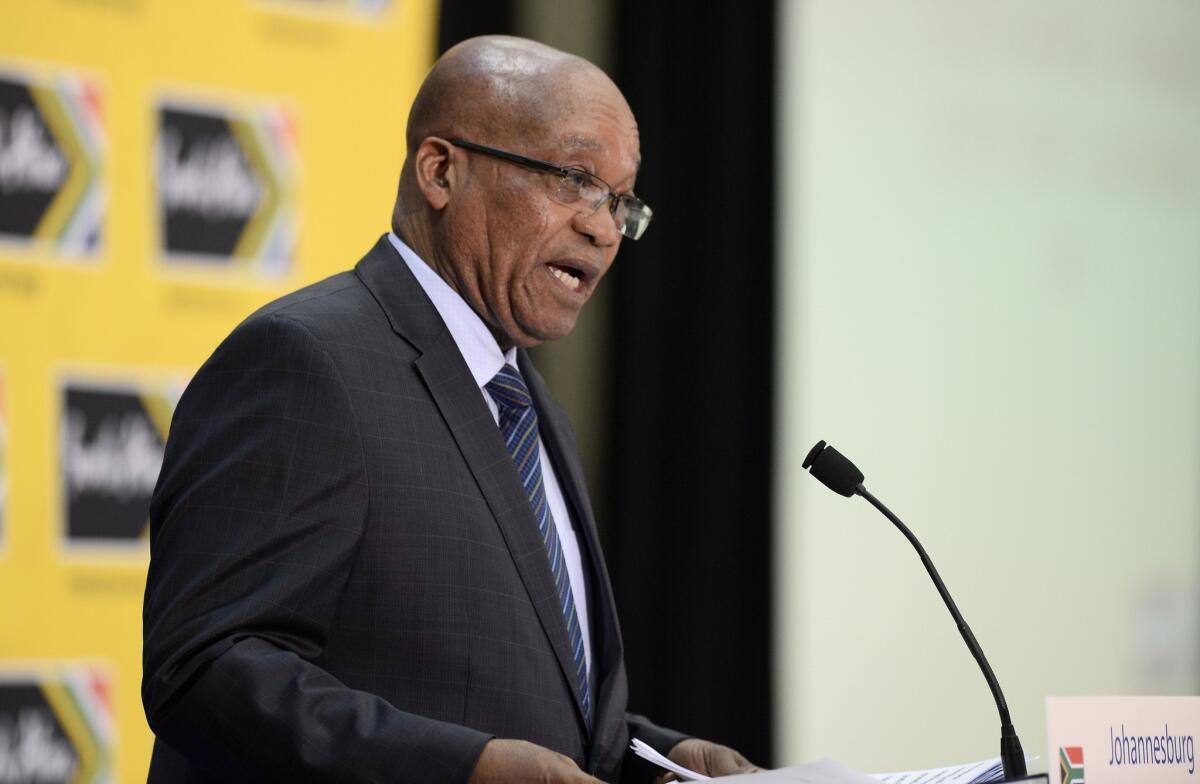South Africa stumbles while looking to market itself abroad

- Share via
JOHANNESBURG, South Africa -- Brand South Africa, the body charged with marketing the nation abroad, has had a tough month.
The International Monetary Fund on Oct. 1 downgraded its growth forecast for South Africa and called on the government to take tougher action to make the country more competitive, increase economic growth and tackle chronically high unemployment.
Then came BMW’s abrupt and embarrassing announcement Oct. 3 that the company had canceled plans to expand its South African operation, because of the cost of successive strikes.
To top off the bad news, on Tuesday the office of South African President Jacob Zuma was forced to apologize after Zuma a day earlier referred disdainfully to Malawi and other parts of Africa, saying that South Africa should not “think like Africans in Africa generally; we’re in Johannesburg.” He made the comments in reference to plans for a toll system to pay for highways.
Brand South Africa Chief Executive Miller Matola said Friday that he didn’t think Zuma’s comments, known locally as his “I am not an African” speech, created negative international perceptions of the country. But he acknowledged that South Africa faced “challenges,” particularly in encouraging business investment.
“We need a national conversation about being more competitive,” he said at a news conference.
Matola said South Africa’s best hope was the government’s 20-year economic growth strategy, the National Development Plan, released last year, which aims to improve infrastructure and competitiveness, raise education levels, create jobs and eliminate poverty.
The country needs a boost like the one it got from hosting the FIFA World Cup soccer championship in 2010, he said.
“The next World Cup for us is the National Development Plan, this national vision for the country, and making it work,” he said.
The plan has been applauded by economists but attacked by leaders of powerful South African trade unions. Union leaders argue that it is premised on undermining workers’ rights and cutting wages.
Finance Minister Pravin Gordhan, meanwhile, blamed negative news reports for the nation’s downgrade last year by major credit-rating agencies.
“Whether we are in opposition or in government, whether we are in business or in any other sector of the economy, if you want to shoot this country down, carry on with the [negative] news flow,” Gordhan told a parliamentary committee, according to SAPA news agency. “Alternatively, change the narrative and talk about how we are going to cooperate to put this country on its proper growth path so we can create jobs and we can create optimism and a better investment climate for the country.”
His comments came after Fitch Ratings on Thursday warned that South Africa faced increasing social and economic problems because of weak growth. The agency said Gordhan’s midterm budget statement Wednesday adjusting South Africa’s GDP growth projection downward to 2.1% from a projected 3% a year ago “paints an even weaker picture for economic growth and provides little comfort that the economy will revive sufficiently to support robust job creation.”
Fitch warned of the danger of further ratings downgrades if Gordhan failed to deliver faster growth and spending cuts.
Brand South Africa’s job of reinventing the narrative has been made more difficult by South Africa’s slump in other global rankings.
In a World Bank index on the ease of opening a new business, South Africa’s ranking fell 10 points from 2012 to 2013, although the overall ease of doing business in the country remained stable.
The same index found that it took 226 days for a company to get electricity in South Africa, compared with 133 days, on average, elsewhere in sub-Saharan Africa and 98 days in member nations of the Organization for Economic Cooperation and Development, which includes the U.S.
Matola said Brand South Africa planned to hold a forum in early November on how to make South Africa more competitive, in a bid to win more support for the National Development Plan.
But analyst Allister Sparks wrote in the newspaper Business Day recently that the National Development plan was at risk because of opposition from unions and lack of political will.
“What we have is a president who has no economic philosophy of any kind,” Sparks wrote. “He is a leader totally preoccupied with a continuing juggling act aimed at keeping all the conflicting factions in his ruling alliance in some kind of balance. That is not even consensus politics, for no consensus ever emerges. It is a perpetual balancing act that results in total immobility.”
ALSO:Mexico: Fatal explosion at candy factory in Ciudad Juarez
Egyptian comic praised by Jon Stewart goes back into the fray
Two Americans taken hostage by pirates off the coast of Nigeria
Twitter: @latimesdixon
More to Read
Sign up for Essential California
The most important California stories and recommendations in your inbox every morning.
You may occasionally receive promotional content from the Los Angeles Times.










